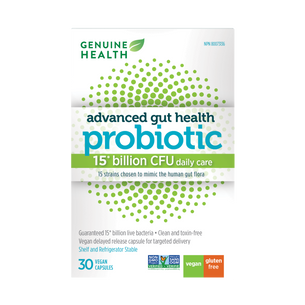I eat yogurt every day. Do I still need to take a probiotic?

We LOVE yogurt for its tart taste and health benefits. One question that we get asked ALL THE TIME is whether yogurt can be used as a daily probiotic supplement. But fermented foods are different from probiotic supplements – here’s why:
Yogurt only contains a few strains of live bacteria
You may notice that probiotic supplements differ in terms of potency and strains, and the same is true for yogurts. The vast majority of quality yogurts (assuming they contain live microbes) will have a few common species of beneficial bacteria, such as Lactobacillus bulgaricus and Streptococcus thermophilus.1 This is far from the 15 diverse strains contained in advanced gut health probiotics.
Yogurt doesn’t have a therapeutic CFU
CFU stands for colony forming units, and it’s the measure of viable bacteria in yogurt or a probiotic supplement.1 To be considered a probiotic yogurt, yogurts must have 1 billion CFU – but this is not a therapeutic dose.2 Many probiotic studies use doses that are significantly higher than what is found in yogurt products.2 This means that you would have to eat a lot of yogurt to gain the proposed health benefits of these probiotics. Again, a far cry from the 15 billion, 50 billion or even 100 billion CFU contained in advanced gut health probiotics.
Yogurt doesn’t have a guaranteed CFU at expiry
While probiotic supplements have a guaranteed CFU at expiry, most yogurt does not. Guaranteed CFU at expiry is important because it ensures that a probiotic will contain the advertised amount of live bacteria right up until the expiration date.3 This isn’t a problem for advanced gut health probiotics – which are made with an overage of bacteria, ensuring that they contain at least the amount of bacteria promised up to their expiry date.
Yogurt doesn’t contain a delivery mechanism
Yogurt and probiotic foods have live bacteria. But there is little to protect that bacteria from the harsh acidity of your stomach. While the bacteria in fermented foods can generally last through shelf-life, the stomach is a different story. Most live bacteria in foods do not survive transit all the way up to your gut.1 It often will depend on the strains used in the product. A quality probiotic supplement – like advanced gut health probiotics will use delayed-release capsules that are designed to resist stomach acid, protecting the strains so they reach the intestine where they can thrive.
You probably don’t eat yogurt every day
Studies have shown that consistency is key for maintaining gut flora. In large probiotic clinical trials, health benefits are usually seen when participants are taking daily probiotics.2 Do you eat yogurt every single day? If you’re like most people, the answer is probably no – and eating yogurt becomes more difficult when you’re travelling or busy. No sweat, advanced gut health probiotics are shelf-stable and packaged in blister packs to ensure capsules are protected. This means you can take it with you wherever you go. No refrigeration necessary!
Our solution? Eat yogurt (or any probiotic-containing food, for that matter) whenever you want, but remember to take advanced gut health probiotics everyday.
Date modified: February 20th, 2025
References
-
Probiotics. Office of Dietary Supplements. Updated November 3, 2023. Accessed February 20, 2025. https://ods.od.nih.gov/factsheets/Probiotics-HealthProfessional/
-
Scourboutakos MJ, Franco-Arellano B, Murphy SA, Norsen S, Comelli EM, L’Abbé MR. Mismatch between probiotic benefits in trials versus food products. Nutrients. 2017;9(4):400. doi:10.3390/nu9040400
-
Ideal CFU Count for Maximum Probiotic Benefits. Fitbiomics. July 10, 2023. Accessed February 20, 2025. https://fitbiomics.com/blogs/the-digest/the-ideal-cfu-count-for-maximum-probiotic-benefits





















































